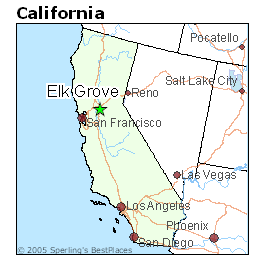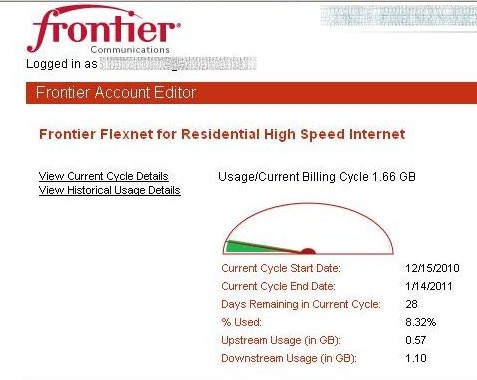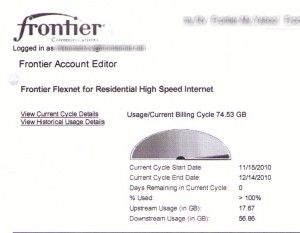 Elk Grove, Calif. residents receiving letters from Frontier Communications claiming they are using the company’s Internet service too much are getting confusing responses from the phone company when calling to register complaints about the Internet Overcharging scheme. Even worse, one company official told a subscriber they have to keep the new usage limits secret “for legal reasons in case we have to change it again.” But no worries, Frontier explained to one customer: if you exceed the secret cap again, you’ll be notified future overages will be conveniently billed on a future Frontier bill.
Elk Grove, Calif. residents receiving letters from Frontier Communications claiming they are using the company’s Internet service too much are getting confusing responses from the phone company when calling to register complaints about the Internet Overcharging scheme. Even worse, one company official told a subscriber they have to keep the new usage limits secret “for legal reasons in case we have to change it again.” But no worries, Frontier explained to one customer: if you exceed the secret cap again, you’ll be notified future overages will be conveniently billed on a future Frontier bill.
Stop the Cap! has been receiving dozens of e-mailed complaints from customers upset that the company’s bait-and-switch broadband also comes with uninformed customer service representatives who can’t deliver straightforward answers to customers trying to understand how they can avoid up to $250 a month for 3Mbps DSL broadband service.
“When I signed up for Frontier DSL, nobody said a thing about usage limits,” writes our reader Trina who lives near Camden Park. “My small business has DSL from Frontier as well and we were horrified when we received a letter telling us we were over-using their service.”
Trina and her husband have four teenage boys living at home, all sharing their Frontier DSL account. When she called the company in response to the letter she received, the confusion began.
 “The first representative didn’t understand what I was talking about and denied there were any limits and said the letter must have been a mistake,” Trina says. “But my husband noticed others in our area were talking about the letter on area message boards so when he called, he got a representative that confirmed the limits were real.”
“The first representative didn’t understand what I was talking about and denied there were any limits and said the letter must have been a mistake,” Trina says. “But my husband noticed others in our area were talking about the letter on area message boards so when he called, he got a representative that confirmed the limits were real.”
Trina was told her home would need to upgrade to Frontier’s $249 monthly DSL service plan, the same one Frontier held over the heads of some customers in Mound, Minn. last year.
“I told them they must be smoking crack — are they serious? There is no way I am going to pay $250 a month for DSL that gives us 1.5Mbps service — not in this world,” Trina says. “My husband laughed when I told him, saying Frontier is going to drive themselves out of business from this stupidity.”
Elk Grove reader Stephen also called Frontier after he received a letter stating he used over 100GB in a month.
“Yeah, I used 104GB according to my router’s logs and Frontier deemed me a bandwidth abuser,” Stephen writes. “Of course the company tried to sell me a plan priced at $100 a month for their lousy DSL service we got suckered into on one of their term contracts.”
Stephen said he’d manage to find a way to shave 5GB off his monthly usage and forego Frontier’s $99 offer until he signs up with a competitor and tells Frontier to take a hike.
“It’s one thing to be abused by a lackluster phone company like Frontier who never did a thing for Elk Grove — it’s another to pay them more for their abuse,” he writes.
S top the Cap! reader Pete, also in Elk Grove, says he can’t get a straight answer over exactly what the monthly limit is.
top the Cap! reader Pete, also in Elk Grove, says he can’t get a straight answer over exactly what the monthly limit is.
“When I called, I was told 5GB by one representative, 100GB by another, but get this — when I logged into the ‘Flexnet’ Usage Meter the company tells you to review, it showed I had a 20GB limit,” Pete says. “I called Frontier on the phone and told them I was so through with them — I can’t stand their nonsense.”
Pete wasn’t alone. Our regular reader Mike figures his cap was actually 20GB a month if the company’s usage meter was to be believed, and he sent pictures.
“I got their nastygram last month over my usage and now my Flexnet meter shows me over the limit,” Pete says. “I have been vocal on a local Elk Grove message board so I’m feeling like this is retaliation.”
In fact, Mike’s usage meter depicts him as well over the arbitrary 100GB limit Frontier suggests in their letter, despite not coming close to 100GB of usage. Ditto for our reader Michelle who lives in Palo Cedro, a community Frontier can largely hold captive thanks to limited competition.
Benjamin, also in Palo Cedro, says Frontier’s move will hurt small businesses in the northern California Shasta County community of 1,200.
“I need high speed Internet to help start my business, which will largely involve uploading and downloading multimedia, (which is hard enough to do on a 1.5 connection) but to increase the cost is absolute insanity,” he says.

Our reader Mike discovered Frontier's usage meter suggests he has far less than a 100GB monthly usage allowance.
Benjamin’s alternatives barely qualify.
“I can either try Clearwire, which works terribly locally and is known for its speed throttles when congested, or HughesNet satellite-delivered Internet, which is overpriced,” Ben adds.
As our readers already know, satellite fraudband is no replacement for real broadband service, because it comes with a “fair access” policy that isn’t fair and doesn’t deliver much access.
“I will fight this any way I have to,” Benjamin says.
John in Elk Grove writes in to say the entire affair is a Frontier shell game.
“It’s pure bait and switch to sell us broadband without limits and then suddenly impose them while we are supposed to be on ‘price protection agreements’ that the company says will keep our prices stable,” John says. “Now we learn it’s all a shell game — they can say we used too much and that doesn’t count with their price protection scam.”
John adds Frontier can change the limits at will, and customers who choose to depart could still face enormous cancellation penalties.
“The Frontier representative I talked to when I called to cancel service told me I owed $300 for ending my contract early,” he said. “I told them to go to hell and that if they tried to collect, I’d personally make it my life’s work to cost them far more than that in lost business.”
Customer anger only increases after speaking with Frontier’s own representatives.

Uh oh. Frontier suggests Mike has already blown through his monthly usage allowance, despite his carefully reduced use of the service.
“Mr. Brown” shares his experience:
I am an Elk Grove resident and a Frontier DSL internet customer. I received the same letter from Frontier about exceeding the 100gb of bandwidth within a 30 day period. It said that I must reduce the amount of use or bump my account up to the next tier of service, a $99/mo business account.
I called the number on the letter to talk to a customer service representative so that they would not disconnect me for not responding within 20 days. I asked him if there is a maximum bandwidth cap. He told me that there is no cap, but that their terms of service says that they can disconnect you if you are exceeding reasonable usage and that Frontier will determine what is reasonable usage. The representative could not help me any further so he connected me with his supervisor.
The supervisor said that Frontier sent this letter out to about 1,000 customers in Elk Grove and that most of the customers who have called after receiving the letter have not questioned them and said they they will reduce their usage.
He also said that there is no longer any $99/mo plan, the only option is to reduce usage. He said they sent the letters out to the costumers who are using more than a reasonable about of bandwidth telling them to use less Internet. Then if they did not, Frontier will send another letter saying that if they use more than a reasonable amount that they will charge the customer for anything over.
He went on to say that Frontier had to remove the statement about the previous 5GB bandwidth cap in their terms and conditions and that for legal reasons they are not going to tell us what the new limit is, in case they have to change it again in the future.
I tried to get him to admit that there is a cap and to tell me what that limit was, but he would not. He would only say that I would be okay if I did not go over 100gb/mo and that if I do, to expect to receive another letter with the new terms that would allow them to charge my account for excess bandwidth.
 The one thing is common with readers we’ve heard from is their urgent search for a new provider.
The one thing is common with readers we’ve heard from is their urgent search for a new provider.
Trina canceled all of her Frontier services at home and at her business and switched to SureWest, a fiber to the home provider. Joining her includes Mike, Stephen, Pete and John. Together, their combined disconnects will cost Frontier more than $500 a month in lost revenue, all because of broadband traffic that costs Frontier far less than 5 percent of that amount. If each customer shares their horror story with friends, family, and neighbors, the loss in revenue could cost far more.
For customers like Mike, he can’t wait to get his SureWest service installed. The company offers to buy out current contracts with companies like Frontier valued at up to $200, and their fiber-delivered broadband service leaves Frontier’s speeds in the dust. Mike says if Frontier gives departing customers a hard time about early cancellation fees, file a complaint with the California Public Utilities Commission Consumer Affairs Branch.
SureWest offers 3/3Mbps service for $36.99 per month, 25/25Mbps service for $51.99 a month, and 50/50Mbps service for $181.99 a month. A $3.99 High Speed Internet features and services charge applies. There are no limits on SureWest’s Internet service.

SureWest delivers several fiber to the home broadband service plans that best Frontier's DSL speeds by a mile.
Frontier offers 3Mbps service with a slower upload speed for $32.99 per month or 10Mbps service for $44.99, both with a required price protection plan and $6.99 monthly modem rental fee.
“Why in the world would you pay Frontier more for less service,” asks Pete. “Once they pile on the administrative fees, surcharges and taxes, it’s well north of $40 a month, and you don’t even get the speed they advertise, much less the usage limits they don’t.”
 After an outpouring of complaints from UK mobile data customers, T-Mobile’s UK division has announced it is backing off implementing ‘new and improved’ usage caps of 500MB per month, down from the 1-3GB customers used to enjoy. But the change of heart will only apply to existing customers. New customers will find themselves second class citizens of the T-Mobile family — stuck with a 500MB allowance other customers won’t have to cope with.
After an outpouring of complaints from UK mobile data customers, T-Mobile’s UK division has announced it is backing off implementing ‘new and improved’ usage caps of 500MB per month, down from the 1-3GB customers used to enjoy. But the change of heart will only apply to existing customers. New customers will find themselves second class citizens of the T-Mobile family — stuck with a 500MB allowance other customers won’t have to cope with.

 Subscribe
Subscribe











